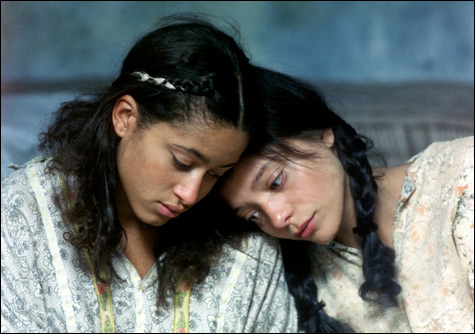
THE WEDDING SONG: Olympe Borval and Lizzie Brocheré try to maintain their friendship in WW2-torn Tunis. |
| “Jewishfilm.2010” | Presented by the The National Center for Jewish Film | Playing at the Institute of Contemporary Art + Museum of Fine Art + Brandeis University | April 7-18 |
They aren’t the most auspicious of couplings: an Arab and Jewish girl in Nazi-occupied Tunis in 1942; a butcher and his apprentice in Haredi Jerusalem; the survivor of a terrorist bombing and a stranger who might be a guardian angel. And the obstacles they face will likely overwhelm them: history, society, and fate. But their struggles and their potential for enlightenment distinguish three of the films in this year’s Jewishfilm.2010 festival.It’s a little known fact about World War II that the Third Reich exploited the desperation and nationalism of Arabs in the Middle East to entice them into turning on their Jewish countrymen. Such insidious propaganda is just one of the problems faced by teenage Myriam (Lizzie Brocheré), daughter of a poor Jewish widow, and her Arab best friend, Nour (Olympe Borval), as they endure the exigencies of war-torn Tunis in Karin Albou’s THE WEDDING SONG (2008; ICA: April 8 at 7 pm; Brandeis: April 11 at 7:15 pm).
Both also must ponder shaky marriage prospects. Myriam rankles at being matched with Raoul (Simon Abkarian), an older, well-to-do Jewish doctor willing to pay the “fine” to the French and German authorities that’s required to maintain her family’s freedom. Nour, on the other hand, fears that her father will break off her engagement to her beloved Khaled (Najib Oudghiri) because he’s unemployed. When the Nazis offer bribes and jobs to Arab residents for squealing on their Jewish neighbors, the girls’ friendship seems doomed. Not even the hammam, where Arab and Jewish women together share the naked sensuality of the bath, offers a refuge from the evils of greed and hatred.
For much of Hair Tabakman’s EYES WIDE OPEN (2009; ICA: April 16 at 7 pm; Brandeis: April 17 at 8:30 pm), the only flesh on view is the raw meat in Aaron’s butcher shop in a stark Haredi neighborhood in Jerusalem. This grim prospect brightens for Aaron (Zohar Shtrauss, who with his beard looks like Dostoevsky) when Erzi (Ron Danker), a homeless yeshiva student with a checkered, mysterious past, starts working for him and takes up residence at the shop.
After the two go skinny-dipping in a spring, Aaron becomes a changed man, embracing his desire for the youth with a kind of zealotry. He talks of changing the world, but he keeps the affair a secret — after all, he has a wife and four kids and is a respected member of the synagogue. All the same, rumors persist, the “modesty squad” pays him a visit, his docile wife gets suspicious, and not even the liberal-leaning rabbi can help much. Neither, it seems, can Aaron help himself. “I feel alive now,” he confesses. “I was dead before.” As oblique and laconic as its characters, Tabakman’s brooding psychodrama aspires to, and attains, a melancholy spirituality.